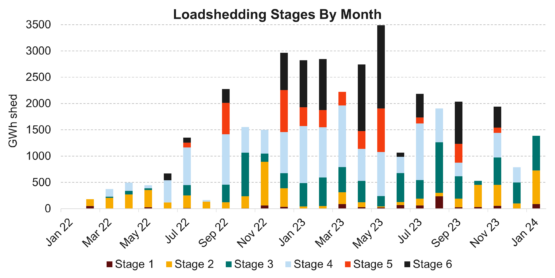Old investment hands know that with crisis comes opportunity or, as Winston Churchill once noted, we should “never let a good crisis go to waste”.
Local markets were hammered last year by a series of crises, from load shedding to poorly functioning rail and ports.
Peregrine CEO and portfolio manager Jacques Conradie sees plenty of opportunity in this otherwise bleak picture. Fixing state-owned companies is one of the three main themes likely to dominate in 2024, along with interest rate cuts and elections.
“The big challenge we have in SA is to get state-owned companies to operate better, and there are signs that this is starting to happen, both at Eskom and Transnet,” says Conradie.
“These two companies are the main drag on economic growth, and we must fix them. There’s no question that part of Eskom’s improvement results from the private sector players providing their own power so they are less dependent on the grid. We expect the country to settle into stages 1 to 3 over the coming months rather than Stages 4 to 6, which was the case in 2023.”
The chart below shows load shedding stages on a month-by-month basis. January 2024 was vastly better than January 2023, though substantially worse than January 2022.
Source: Peregrine
The end of load shedding may still be 12 to 18 months away. Still, the country will experience a steady improvement over this year, particularly if some of the coal-fired power stations operating at 40 to 50% efficiency can be brought back to pre-crisis levels of 60 to 70%.
There are also signs of a turnaround at Transnet, with coal freight volumes likely to hit around 50 million tons for the year to March 2024 – which is still a long way from historical volumes but a gain on previous quarters nonetheless.
The next theme to watch is for interest rates to ease, though SA is likely to be a follower rather than a leader.
That will take some of the stress off company balance sheets and allow for some earnings recovery over the next two years.
Then there are the elections, both in SA and abroad. Conradie points out that 49% of the world’s population will head to the polls in 2024, from SA to the US and India. The potential for shock results is ever present, particularly as geopolitical tensions boil from the Red Sea to Eastern Europe.
“What’s clear from the polls in SA is that we are likely entering the era of a coalition government, and some provinces may change hands,” says Conradie. “We don’t particularly see this as a major risk, but what the outcomes of the elections will do is give investors some clarity as to the country’s future governance.”
The JSE’s weak performance in 2023 – it was up just 3% for the year – has created interesting opportunities, such as banks, some of which are trading at price-to-earnings (PE) multiples of six to eight times and paying dividend yields (DYs) of 7.5 to 9%.
“We see these as very attractive opportunities, especially at a time when banks are still growing earnings. In fact, banks’ valuations are not far from where they were in 2008 during the financial crisis,” adds Conradie.
“A lot of smaller and medium-sized companies also look attractive. They are unloved because the big funds are focused elsewhere, and there’s a lack of foreign demand.”
One mid-sized stock that has caught the eye of Peregrine fund managers is Motus, which looks cheap at a PE of five times. It services the vehicle after-care market and downrated during the interest rate hiking cycle. Conradie believes a rerating is on the cards as interest rates start declining.
One of Peregrine’s biggest holding is Naspers and Prosus, which derive a substantial part of their earnings from Chinese tech giant Tencent, now trading at a PE of roughly 10. This is the lowest it’s been in a while and reflects a slowing Chinese economy and increased regulatory pressure from the government.
Peregrine is also big on luxury goods producers like Richemont and LVMH, both of which have declined in price to more attractive entry levels.
“Another trend we are keeping a close eye on is AI, which will change the world massively in the next five to 10 years, even more than the arrival of the internet, cloud computing and other tech waves that have redefined the business world,” says Conradie.
“Companies investing in AI, like Meta and Amazon, will be able to ride this wave.”
Overall, he expects a better year for the JSE in 2024.
Peregrine Capital’s two flagship funds, with the High Growth Fund and Pure Hedge Fund achieving impressive returns of 14.7% and 12.5% respectively, are well above the JSE All Share index. The two funds, with more than R15 billion under management, have a low correlation with their peers and the overall market due to their unique portfolio construction and identification of opportunities not simply linked with the overall index.
The High Growth Fund has grown initial investor funds 100 times over 25 years, making it the first fund in SA to achieve this outcome.
“We look for hidden or trapped value,” says Conradie.
“Sometimes, we have growth companies, sometimes value companies, and other times, we focus on unloved shares. Our objective is to beat the market over the medium term, which means carefully adjusting our risk, limiting our losing positions, and making strategic decisions on company or economic data. The results speak for themselves.”
Brought to you by Peregrine Capital.
Moneyweb does not endorse any product or service being advertised in sponsored articles on our platform.

